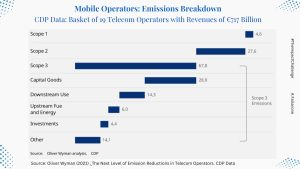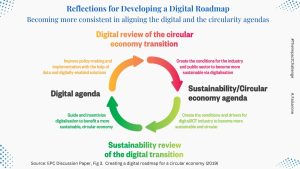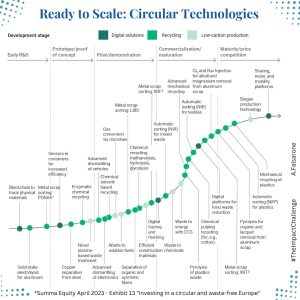NEWSLETTER by Alessia Falsarone. The author acknowledges the team at The University of Chicago Circular Economy and Sustainable Business Management Program and all participants of the innovation knowledge hub for their insights and collaboration.
Digitization has emerged as the fast lane to more-resource efficient and robust economies. It is also the fastest lane to circularity – whether through the analysis and utilization of data across industries and stakeholders, or purely on the basis of the disruptive business models that are powering the circularity transitions of entire countries.
However, with one-third of workers lacking adequate digital skills, a weak labor market poses significant obstacles in the transition towards a circular and decarbonized future.
| The Science of Impact
When addressing the role of digitalization as enabler of circularity and a low carbon future, it’s natural to think of the role played by mobile connectivity operators. After all, nearly 80% of the global mobile industry and 70% of world’s connectivity have set environmental targets through their CDP disclosures. GSMA, the organization that represents mobile network operators worldwide, has advocated for a shared vision for the mobile industry to get to net zero by 2050, where the circularity of mobile devices can easily become a breeding ground for a digital transformation across supply chains of both retail and industrial clients. This is partially due to the increased focus on Scope 3 emissions and the fact that most mobile operators have moved to counteract Scope 2 emissions (those caused by direct energy use) by sourcing renewables.
 >>click to zoom in | Credit to Oliver Wyman (2021) and GSMA
>>click to zoom in | Credit to Oliver Wyman (2021) and GSMA
Against a less than 28% total contribution attributed to Scope 2 emissions, Scope 3 encompass both downstream and upstream sectors. In addition, the 10-year technology cycle that follow the evolution of the Gs, calls for a stronger focus on developing a circularity vision supported by a digital transformation of the high polluting sectors of the economy.
| Circularity Roadmaps Explained
When discussing roadmaps for circular economy initiatives, it is important to consider the role of advancing digital resources and capabilities. Building competencies in digital technologies is necessary for the transition to a circular economy. This involves cultivating a talent pool that recognizes opportunities and risks across sectors and is capable of creating cross-disciplinary processes and tools. Essentially, the circular economy is built upon a foundation of digital building blocks. However, what does the concept of digitization specifically entail in the context of a circular economy?
I often reference to the researchers at Aalto University, as well as the teams at Climate-KIC and other practitioners in the field, such as European Policy Centre‘s Annika Hedberg, Stefan Sipka, and Johan Bjerkem. They have long advocated for aligning circular and digital economy efforts, and their 2019 discussion paper, “Creating a Digital Roadmap for the Circular Economy”, lays out key triggers for progress on a circular transition rooted in digitization. In addition to collaborating on data, tools, and expertise, they identify the importance of developing a governance framework to channel economic incentives and maintain high standards of accountability.
This is crucial, as any industrial agenda that introduces a digital review of circularity policies must also include a sustainability review of the digital transition to ensure consistency and avoid conflicting outcomes.
 >>click to zoom in | Credit to the European Policy Center, Discussion Paper 5 July 2019
>>click to zoom in | Credit to the European Policy Center, Discussion Paper 5 July 2019
| Investing in the Circular Economy
The world’s top multilateral development banks are ramping up collaboration to promote investments in the circular economy. As a private sector investor, this was one of the key takeaways I gathered from the World Circular Economy Forum held in Finland at the end of May.
The European Investment Bank (EIB) alone has been lending in the range of €3.4 billion over the past 5 years, with a record level of over €1 billion alone in 2022 (source).
Private sector investors, have been closely following these developments. Stockholm-based Summa Equity has recently predicted that EU circular markets could be worth €1.5 trillion by 2040. The “new asset base” for the circular economy identified by Summa includes investments in equipment, processing plants and what it calls supporting infrastructure.
According to their research, circular business models in the EU could generate over €250 billion in revenue in 2030, representing 15% of the physical consumer goods market, and close to €500 billion in revenue by 2040. Not surprisingly, increasing investment in technology innovation and digital solutions are leading indicators of the degree of maturity of circular technologies.
 >>click to zoom in | Investing in a circular and waste-free Europe, Summa Equity (2023)
>>click to zoom in | Investing in a circular and waste-free Europe, Summa Equity (2023)
In addition, private investors in North America are starting to pay attention, with a handful of impact investors that have added circularity to their investment mandates while also growing their skills and appetite for innovation financing.
In recent weeks, the Canada Pension Plan Investment Board (CPP Investments | Investissements RPC) has invested short of a €1 billion for the environmental services operator of FOMENTO DE CONSTRUCCIONES Y CONTRATAS, S.A., a diversified conglomerate listed in Spain, with operations also in Central Europe and the UK. This investment gives CPP Investments a direct access point to the global circular economy megatrend. In fact, through the recovery of materials and products, and the conversion of waste into a value-add economic resource, it becomes a key pillar of the fund’s infrastructure investment strategy.
Investment mandates have started to incorporate circularity across a variety of investors, including early stage VCs of the like of Autotech Ventures. The company has recently announced that it intends to branch out from its base of early-stage ground transportation ventures through its recent $230 million fund, to seek opportunities in logistics, supply chain and the circular economy.
Circularity assets continue to create readily available entry points across a wide range of risk appetites.
| You don’t want to miss this week
From Brisbane, to London, and Dubai, this week offers new opportunities to connect with fellow circularity practitioners both in person and in hybrid mode.
Discover, grow and leave your mark!
〉June 15th – 16th: Circular Bioeconomy in a Decarbonised World Symposium (Brisbane, Australia). Industry representatives, government officials, and academics will gather at The University of Queensland for the annual symposium featuring leading bioeconomy trends in areas such as biohydrogen; the circularity of chemicals and materials; and biomanufacturing. The event offers an opportunity to jointly propose innovative solutions and policies to reduce (biomass) waste and carbon emissions, address energy security, while also providing economic opportunities for creating value-adding biochemicals and fuels. Dr. Anthony Halog is chairing this year’s gathering.
〉June 15th: Ellen MacArthur Foundation Summit 2023 (London, UK). Note: you can join the headline session “Redesigning the future: a circular economy showcase” on livestream here at 18:30 BST. How will business succeed in a future where the circular economy is the norm? In collaboration with the Ellen MacArthur Foundation, design leader IDEO has created an immersive experience imagining a world where the circular economy is a pervasive reality. From reimagining everyday products to envisioning circular social dynamics, this exhibition has been created to inspire the practitioners of now to rethink the opportunities of the future. To follow, the “redesign of food” theme will explore a visionary supermarket featuring food products designed to support nature thrive while reimagining urban living.
〉June 15th: Waste Management and Circular Economy Conference (Dubai Marina). Organized by Waste & Recycling MEA Magazine, the conference will focus on identifying gaps in the journey towards circularity and discussing strategies to fill them. It will also provide a platform to share best practices and success stories in circularity model adoption, as well as to explore how the circular economy can be a climate strategy. Among others, regional circularity expert Dr. Rashed Karkain, Priya Sarma (Unilever), Raji Hattar (Aramex International), and Ivano Iannelli (Emirates Global Aluminium (EGA)) will discuss ways to put the region on track to achieve its net zero goals.
Off to another impactful week!
| about
Alessia Falsarone is executive in residence, practitioner faculty at the University of Chicago, where she leads the Circular Economy and Sustainable Business program. The article is based on the author’s newsletter A Week of Circularity from the innovation knowledge hub.
| All opinions expressed are those of the author and/or quoted sources. investESG.eu is an independent and neutral platform dedicated to generating debate around ESG investing topics.









